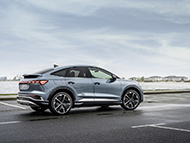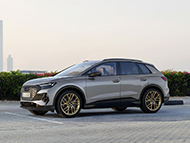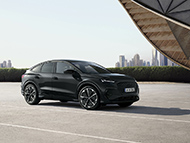From Audi Press Release
Audi is systematically continuing its course for growth in fully electric models. The Audi Q4 e-tron family has contributed to the strong growth in Audi’s delivery of battery electric vehicles (BEV) in the first half of 2023 (+51.2 percent). Now, the Q4 e-tron is being comprehensively updated for the 2024 model year with a newly tuned suspension, improved efficiency, characteristic sound, and enhanced standard equipment. In addition to an optimized drivetrain and increased charging power, Audi is expanding the models’ driver assistance systems.
All Q4 e-tron models feature a large battery that provides 77 kWh of net energy (82 kWh gross). Optimized cell chemistry has improved the DC charging power so that they charge from 10 to 80 percent in around 28 minutes under ideal conditions. The quattro models now achieve a maximum DC charging power of 175 kW, and the rear-wheel drive models a maximum of 135 kW.
The battery protection function automatically limits the charge level to 80 percent to extend battery life. To ensure intelligent trip and charge planning, the e-tron route planner prioritizes high-performance HPC stations (High-Power Charging facilitates ultrafast charging). If the driver takes the suggested route, the system activates battery preconditioning for the period before the new Audi Q4 e-tron models reach the selected, stored charging station. If the driver selects an HPC station as the destination, the system activates thermal conditioning to ensure the battery charges as quickly as possible at the station. For the first time, the Audi Q4 e-tron model family also features post-conditioning. Here, the vehicle’s thermal management system cools the battery, for example, if it exceeds a fixed temperature threshold after driving or charging.
New drive system with higher efficiency and more power
For both rear-wheel drive and quattro all-wheel drive, all Audi Q4 e-tron models now feature a permanently excited synchronous machine (PSM) on the rear axle. The update gives the Audi Q4 e-tron model family a completely redeveloped PSM notable for its higher efficiency and greater power.
The Audi Q4 45 e-tron and the Audi Q4 Sportback 45 e-tron with rear-wheel drive produce 286 PS and accelerate from 0-62mph in 6.7 seconds; the more aerodynamic Sportback version is now capable of reaching up to 339 miles on the WLTP cycle.
The Audi Q4 45 e-tron quattro and the Audi Q4 Sportback 45 e-tron with 286 PS take 6.6 seconds. The top-of-the-range models Audi Q4 55 e-tron quattro and Audi Q4 Sportback 55 e-tron quattro models with 340 PS accelerate from 0-62mph in only 5.4 seconds. The top speed for all models is now 112mph.
The new electric motor uses optimized thermal management for greater efficiency. The system features energy-saving cooling: Due to the geometry and arrangement of the gear wheels in the transmission as well as specially shaped components for transporting and distributing the oil, temperatures in the powertrain hardly rise at all. The cooling circuit, in turn, ensures the oil is temperature-controlled. A related component is the water-cooling jacket on the outside of the stator.
Improved steering response: the suspension with Audi’s DNA
In keeping with Audi’s DNA, the new tuning for the suspension improves the balance for even greater comfort, driving fun, and stability. Whether the model has standard or sport suspension or suspension with damper control, the steering characteristics and the damper tuning have been specially adapted. The result is harmonious damping, improved steering response, and tighter load control.
With the sport suspension, the body is 15 millimetres lower. The new spring/shock absorber tuning and the new steering tuning provide a balanced, solid driving experience and a sporty steering response typical of an Audi. The Audi Q4 e-tron models respond more directly to steering changes for greater sportiness and agility.
New function: assisted lane changes
As an option, the update enables the Audi Q4 e-tron family to use assisted lane changes in combination with adaptive cruise assist for speeds of 56mph on motorways for the first time. Part of the Technology Pack Pro, assisted lane changing can be activated via the MMI.
The new system uses white arrows in the instrument panel and in the augmented reality head-up display to indicate to the driver whether it is safe to change lanes and which lane it is safe to change to. If the driver initiates the lane change by tapping the turn signal, the system actively assists the driver in steering. Once the vehicle is in the new lane, it switches the turn signal off again. During the lane change, the person behind the wheel retains full responsibility. Assisted lane changes are made possible using data from the rear radar.
Among the optional systems, adaptive cruise control specializes in regulating the distance to the vehicle in front by accelerating and decelerating. Adaptive cruise assist (comes as part of Technology Pack Pro) expands the functionality of adaptive cruise control by using slight steering corrections to keep the car in the centre of the lane. To maintain lateral control, all the driver needs to do is lightly touch the capacitive steering wheel that is part of the system to demonstrate their attention.
Side assist monitors traffic behind and alongside the car and warns the person behind the wheel if they are about to change lanes in a critical situation. This system also uses information from the rear radar sensors.
Critical driver assistance systems are standard, while the optional systems come with Technology Pack Pro package.
Electric pioneer Audi Brussels to produce the Q4 e-tron
From the end of the year, Audi will produce the Audi Q4 e-tron model series at its Brussels site in addition to production in Zwickau. This move, a response to the high demand for the model, allows Audi to increase production capacity. Audi Brussels has been producing the Audi Q8 e-tron and the Audi Q8 Sportback e-tron since December 2022. Prior to that, the Audi e-tron, the first fully electric production model from the brand with the four rings, has been rolling off the production line in Brussels since 2018. The plant in Brussels is the world’s first independently certified carbon-neutral high-volume production facility in the premium segment.
In the long term, Audi plans to convert all its sites to the production of electric models. After Brussels and Böllinger Höfe at the Neckarsulm site for the Audi e-tron GT, Ingolstadt will begin the ramp-up for the first model on the new Premium Platform Electric (PPE). By the end of the decade, each Audi plant will produce at least one fully electric model. As already achieved in Brussels and Győr, all Audi sites aim to achieve net carbon-neutral production* by 2025.
*1 Audi understands net-zero CO2 emissions to mean a situation in which, after other possible reduction measures have been exhausted, the company offsets the carbon emitted by Audi’s products or activities and/or the carbon emissions that currently cannot be avoided in the supply chain, manufacturing, and recycling of Audi vehicles through voluntary offsetting projects carried out worldwide. In this context, carbon emissions generated during a vehicle’s utilization stage, i.e. from the moment it is delivered to the customer, are not taken into account.








